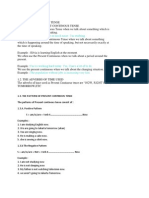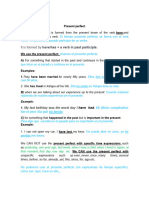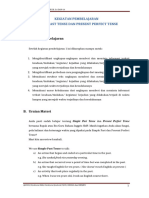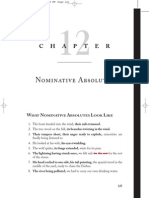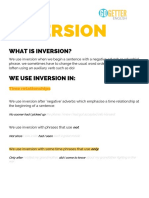Guru Pembimbing
Guru Pembimbing
Uploaded by
Rita SangidahCopyright:
Available Formats
Guru Pembimbing
Guru Pembimbing
Uploaded by
Rita SangidahOriginal Description:
Original Title
Copyright
Available Formats
Share this document
Did you find this document useful?
Is this content inappropriate?
Copyright:
Available Formats
Guru Pembimbing
Guru Pembimbing
Uploaded by
Rita SangidahCopyright:
Available Formats
Guru Pembimbing :
Hedi Prawito S.Pd
Di Susun Oleh :
Nama
Kelompok 10 :
1. Anne Retno Roifah
2. Dina Zuraidha
3. Selvia Novitasari
Kelas : XI IPA 6
SMA NEGERI 1 BELITANG KABUPATEN OKU TIMUR PROVINSI SUMATERA
SELATAN TAHUN AJARAN 2018/2019
1. PRESENT PERFECT TENSE
a. Definition
The present perfect is verb tense used to indicate a link between the present and the
past. The time of the action is before now but not specified, and we are often more
interested in the result than in the action itself.
Adverb of time : yet (at the end of the sentence (-)), already (after have/has (+)) ,
for(followed by the amount of time), since (followed by start time).
b. Function
The present perfect is often used to suggest that a past action still has an effect upon
something happening in the present.
Each of the highlighted compound verbs in the following sentences is in the present
perfect tense :
1. “ They have not delivered the documents we need.” This sentence suggest that the
documents were not delivered in the past and that they are still undelivered.
2. “The health department has decided that all high school students should be immunized
against meningitis.” The writer of this sentence uses the present perfect in order to
suggest that the decision made in the past is still of importance in the present.
3. “The heat wave has lasted three weeks.” In this sentence, the writer uses the present
perfect to indicate that a condition (the heat wave) began in past and continues to affect
the present.
c. Formula
Verbal
+ S + has/have + V3
- S + has/have + not + V3
? Has/have + S + V3...?
For example :
I have opened the door. (Saya telah membuka pintu itu.)
Nominal/ non verbal
+ S + has/have + been + nv
- S + has/have + not + been + nv
? Has/have + S + been + nv...?
For example :
She has been here since yesterday. ( Dia telah berada disini sejak kemarin.)
2. PAST PERFECT TENSE
a. Definition
The past perfect tense is a verb tense used to express actions that occurred in the past
that finished before another action in the past started.
Adverb of time : until, before, after, as soon as.
b. Function
The past perfect tense is used to refer to actions that took place and were completed in
the past. The past perfect is often used to emphasize that one action, event or condition
ended before another past action, event, or condition began.
Each of the highlighted verbs in the following sentences is in the past perfect:
1. “Angelo arrived at 5:00 p.m. but Mr. Kintanar had closed the store.” All the events in
this sentence took place in the past, but the act of closing the store takes place before
Angelo arrives at the store.
2.“After we located the restaurant that Keith had raved about, we ate supper there every
Friday.” Here the praise ("had raved") precedes the finding ("located") of the restaurant.
Both actions took place sometime before the moment of speaking or writing.
3. “The elephant had eaten all the hay so we fed it oats for a week.” In this sentence, both
actions take place in the past, but the eating of the hay ("had eaten") preceded the eating
of the oats ("fed").
c. Formula
Verbal
+ S + had + V3
- S + had + not + V3
? Had + S + V3...?
For example :
Rina had studied English before she came to my house. (Rina sudah belajar Bahasa
Inggris sebelum dia datang ke rumahku).
Nominal/ non verbal
+ S + had + been + nv
- S + had + not + been + nv
? Had + S + been + nv...?
For example :
It had been long time after we met at Jogja several years ago.
(Sudah lama sekali setelah kita ketemu beberapa tahun lalu di Jogja).
3. FUTURE PERFECT TENSE
a. Definition
The future perfect tense is a verb form or construction used to describe an event that is
expected or planned to happen before a time of reference in the future.
Adverb of time : by the end of this year, by next week, ect.
b. Function
The future perfect is used to refer to an action that will be completed sometime in the
future before another action takes place.
Each of the highlighted verbs in the following sentences is in the future perfect tense:
1. “The surgeon will have operated on 6 patients before she attends a luncheon meeting.”
In this sentence, the act of operating ("will have operated") takes place in the future
sometime before the act of attending ("attends").
2. “The plumber and his assistant will have soldered all the new joins in pipes before they
leave for the next job.” Here, the plumber's act of soldering ("will have soldered") will
precede the act of leaving ("leave").
3. “By the time you get back from the corner store, we will have finished writing the
thank you letters.” In this sentence, the act of finishing ("will have finished") occurs well
before the act of starting ("starts").
c. Formula
Verbal
+ S + will/shall + have + V3
- S + will/shall + not + have + V3
? Will/Shall + S + have + V3...?
For example :
We will have arrived here by seven o’clock. (Kami akan tiba di sini pada pukul tujuh.)
Nominal/ non verbal
+ S + will/shall +have+ been + nv
- S + will/shall +have + not + been + nv
? Will/shall + S +have+ been + nv...?
For example :
He will have been in Jakarta by the end of this month. (Dia akan berada di Jakarta
pada akhir bulan ini.)
Question And Answer
Question:
About Present Perfect Tense :
1. .We have……. this new novel together since yesterday
a.reads
b.read
c.reading
d.readed
2. Bagas : You look so unhappy, Nata. What’s the problem?
Nata : My father . . . . . his job.
a. Has just lost
b. Have just lost
c. Losing
d. Loses
3. They . . . . . resigned their current jobs this year.
a. Are
b. Has
c. Have
d. Were
4. We . . . . . out of gasoline.
a. Has just runnimg
b. Has just run
c. Have just running
d. Have just run
About Past Perfect Tense :
5. Gillian … to the store before she went home.
a. Has going
b. Is going
c. Gone
d. Had gone
6. When she arrived at the station, the train .....
a. had left
b. leave
c. living
d. had left
7. ________ visited Toronto before your trip last summer?
a. Have you ever
b.You had
c.Had you ever
d.Had ever you
About Future Perfect Tense :
8. By the end of this month, I ..... back from Singapure.
a. am shall
b. shall have
c. will be
d. am will
e. will have been
9. Next year, I ... in Bandung
a. will have stay
b. stay
c. will have stayed
d. stayed
10. Will we....studied English for 3 years by the end of this month.
a. has
b. to have
c. to has
d. have
e. to having
Answer :
1. b
2. a
3. c
4. d
5. d
6. a
7. c
8. e
9. c
10. d
You might also like
- Book 16 PDFDocument256 pagesBook 16 PDFarthsabogal100% (6)
- English 8 Lesson Plan ParallelismDocument5 pagesEnglish 8 Lesson Plan ParallelismPaulJamesGarciaLuzon81% (27)
- Grammar Practice PG 5-8Document4 pagesGrammar Practice PG 5-8Johnny SejasNo ratings yet
- Present Future Perf TenseDocument6 pagesPresent Future Perf Tensesumire shiny dartokNo ratings yet
- Sheet-5Document41 pagesSheet-5rimonNo ratings yet
- Tense, Active-Passive, Direct & Indirect (New)Document14 pagesTense, Active-Passive, Direct & Indirect (New)AbdukNo ratings yet
- Tenses 28Document5 pagesTenses 28Satyam SinghNo ratings yet
- Simple Tenses: A. Simple Present TenseDocument9 pagesSimple Tenses: A. Simple Present TenseJun YuNo ratings yet
- Tenses NewDocument15 pagesTenses NewKaviya RaviNo ratings yet
- Future Perfect Tense & Future Perfect Continous TenseDocument6 pagesFuture Perfect Tense & Future Perfect Continous TenseKintan Budi Kresnanda100% (1)
- B.ingg TensesDocument17 pagesB.ingg TensesWindy ApriliaNo ratings yet
- Lesson 2 Cdi5Document6 pagesLesson 2 Cdi5catherinemarquez1029No ratings yet
- Mid Test English For Tourism: Exercise 1.6 Postcards From Singapore and AmsterdamDocument7 pagesMid Test English For Tourism: Exercise 1.6 Postcards From Singapore and AmsterdamVisa RanicoNo ratings yet
- Present TenseDocument21 pagesPresent Tenseadinda putriNo ratings yet
- TensesDocument11 pagesTensesnassimlbitar2019No ratings yet
- 16 TensesDocument31 pages16 TensespurwantiNo ratings yet
- Tenses 7 & ModalsDocument29 pagesTenses 7 & ModalsasharimpNo ratings yet
- Tenses in EnglishDocument16 pagesTenses in EnglishSandeep Goud KalalNo ratings yet
- 16 Tenses in EnglishDocument8 pages16 Tenses in EnglishLaura Uli SiahaanNo ratings yet
- Tema 04Document6 pagesTema 04Anayenssi AlejandreNo ratings yet
- Common Errors Final 2Document16 pagesCommon Errors Final 2charu1302100% (1)
- El Pasado Perfecto en Inglés Corresponde Al Pluscuamperfecto de Español (Yo HabíaDocument9 pagesEl Pasado Perfecto en Inglés Corresponde Al Pluscuamperfecto de Español (Yo HabíaLorena Fernández MorenoNo ratings yet
- English ProjectDocument13 pagesEnglish Projectruchirpawar4No ratings yet
- TensesDocument22 pagesTensesBhawna JhaNo ratings yet
- attachment(1)Document7 pagesattachment(1)kamsiyonnamani03No ratings yet
- The Tense SystemDocument7 pagesThe Tense SystemMohammed ShahabNo ratings yet
- Activity Sheet Perfect Tenses QTR 1 WK 4Document3 pagesActivity Sheet Perfect Tenses QTR 1 WK 4Jandelle Reigne FerreraNo ratings yet
- De Thi Hoc Ki 2Document10 pagesDe Thi Hoc Ki 2ducduy1803No ratings yet
- Simple Present TenseDocument25 pagesSimple Present Tensebangkit99No ratings yet
- PRESENT PERFECT Vs PAST TENSE-Shania SalsabilaDocument10 pagesPRESENT PERFECT Vs PAST TENSE-Shania Salsabila28– Shania SalsabilaNo ratings yet
- 17796c84-6968-4142-814f-91fe0aac50daDocument6 pages17796c84-6968-4142-814f-91fe0aac50daMv SirishaNo ratings yet
- Tenses ReviewDocument7 pagesTenses Reviewmr_septian26100% (2)
- Simple Present Tense (Subj + Verb I/+s or Es)Document25 pagesSimple Present Tense (Subj + Verb I/+s or Es)Darius GanNo ratings yet
- Past S.-Present Perfect SimpleDocument16 pagesPast S.-Present Perfect SimpleSilvia MariaNo ratings yet
- Tieng AnhDocument79 pagesTieng AnhKido GroupNo ratings yet
- Present Perfect TenseDocument8 pagesPresent Perfect TenseNguyễn Thị Bích TrâmNo ratings yet
- Grammar 2Document17 pagesGrammar 2dy.chairunnisaNo ratings yet
- Class 7 English Notes Tenses-1Document7 pagesClass 7 English Notes Tenses-1Aryan Pandey100% (1)
- TensesDocument24 pagesTensesDelva Aruna BabyshopNo ratings yet
- Active and Passive Voice English PapersDocument8 pagesActive and Passive Voice English Papersايو كاي كايNo ratings yet
- Future Perfect TenseDocument13 pagesFuture Perfect TenseFitrianul Imamah Ambar100% (1)
- Inglés 2 Evaluación 3º ESODocument9 pagesInglés 2 Evaluación 3º ESOLorena Fernández MorenoNo ratings yet
- Makalah Active & Passive VoiceeDocument14 pagesMakalah Active & Passive VoiceeMuhibbatul Aulia RahmaNo ratings yet
- 1409241639436208Document26 pages1409241639436208swjjdfdt2sNo ratings yet
- Exercise 13 Past Perfect TenseDocument9 pagesExercise 13 Past Perfect TenseFauziatun NisaNo ratings yet
- Verbal Tenses 1o TheoryDocument8 pagesVerbal Tenses 1o Theoryiscotfer3336No ratings yet
- Rumus Tenses Bahasa InggrisDocument7 pagesRumus Tenses Bahasa Inggris1062 I Ketut WidiartaNo ratings yet
- Brown Aesthetic Group Project PresentationDocument44 pagesBrown Aesthetic Group Project Presentationmutiah mutiaraNo ratings yet
- Present Perfec1 y Sus ConjugacionesDocument8 pagesPresent Perfec1 y Sus ConjugacionesJair G.S.LNo ratings yet
- PRESENTPERFECTTENSEDocument62 pagesPRESENTPERFECTTENSEMuhammad_Al_We_5107100% (1)
- Papers: Simple Present Perfect TenseDocument13 pagesPapers: Simple Present Perfect TenseMuhammad Hendrik KotoNo ratings yet
- JWJWJWDocument26 pagesJWJWJWShankSoham MohantyNo ratings yet
- Time and TenseDocument5 pagesTime and TenseDevanshi Bansal100% (1)
- TUGAS BAHASA INGGRIS1Document12 pagesTUGAS BAHASA INGGRIS1sdn2 parungsariNo ratings yet
- Tense (All 12 Types)Document6 pagesTense (All 12 Types)Ahans GamerNo ratings yet
- 1 Lesson Tense SystemDocument22 pages1 Lesson Tense Systemxtnc6n9ktpNo ratings yet
- TENSESDocument6 pagesTENSESThilagavathy ThirugnanasambandamNo ratings yet
- Tenses (1)Document9 pagesTenses (1)srihari18711871No ratings yet
- Lita Kusmira Tiara Risti Alfanani: Kelompok: 9Document9 pagesLita Kusmira Tiara Risti Alfanani: Kelompok: 9rahsetaNo ratings yet
- Materi PResent Perfect TenseDocument8 pagesMateri PResent Perfect Tensemirumi.avataraNo ratings yet
- Lesson 1 - Sentence Type and Pattern: English - Level 1Document4 pagesLesson 1 - Sentence Type and Pattern: English - Level 1Orlici KarimNo ratings yet
- DLL - Grade3 ENGLISH - 1Q - WEEK5Document6 pagesDLL - Grade3 ENGLISH - 1Q - WEEK5Jane Charish Ocmer100% (1)
- Tense of A Sentence Gives Idea of TimeDocument25 pagesTense of A Sentence Gives Idea of Timelaksh1No ratings yet
- Early Writing - Sentence BuildingDocument19 pagesEarly Writing - Sentence BuildingLau Li LianNo ratings yet
- 02Document3 pages02salima190No ratings yet
- Bai Giang Chi Tiet Tieng Anh 11Document277 pagesBai Giang Chi Tiet Tieng Anh 11tuantu_5160% (5)
- The Five Paragraph EssayDocument3 pagesThe Five Paragraph EssayJulianaJamilNo ratings yet
- A1 AtSchool L1Document31 pagesA1 AtSchool L1Marie DenginNo ratings yet
- Choose The Correct Word in The Brackets: Adjectives and AdverbsDocument2 pagesChoose The Correct Word in The Brackets: Adjectives and AdverbsYoncé Ivy KnowlesNo ratings yet
- 9a0 15.06Document22 pages9a0 15.06Ngọc Mai NguyễnNo ratings yet
- Modelo Examen Final 2º ESO PDFDocument2 pagesModelo Examen Final 2º ESO PDFJaime Falagan100% (1)
- PI Lesson 2 RevisedDocument38 pagesPI Lesson 2 RevisedLinh Le Thi ThuyNo ratings yet
- NominativeDocument10 pagesNominativeJj JanzbizzareNo ratings yet
- First Term Examination: 1450 Vanguard RDDocument3 pagesFirst Term Examination: 1450 Vanguard RDHayet HoutaNo ratings yet
- Answers of Q.1 Q. 2Document2 pagesAnswers of Q.1 Q. 2Maya DanaNo ratings yet
- C2 Grammar - InversionDocument3 pagesC2 Grammar - InversionANDREANo ratings yet
- Punctuation 2023 Without AnswersDocument29 pagesPunctuation 2023 Without AnswersessamwahbaNo ratings yet
- Big Surprise 3 English Test Unit FourDocument3 pagesBig Surprise 3 English Test Unit FourAnonymous HxAcjKYT100% (1)
- Class 4 SyllabusDocument11 pagesClass 4 Syllabuskritisingh010897No ratings yet
- Assignment 1 Pedagogic 1Document6 pagesAssignment 1 Pedagogic 1Danna GomezNo ratings yet
- Examen Final Ingles 6to AñoDocument7 pagesExamen Final Ingles 6to AñoStephanie GuamanNo ratings yet
- ENG2601 - Tutorial LetterDocument102 pagesENG2601 - Tutorial LetterOnikeNo ratings yet
- 9679 Afrikaans: MARK SCHEME For The October/November 2010 Question Paper For The Guidance of TeachersDocument7 pages9679 Afrikaans: MARK SCHEME For The October/November 2010 Question Paper For The Guidance of TeachersJazzNo ratings yet
- CorrectionDocument2 pagesCorrectionMuhammad Naveed AlamNo ratings yet
- English ThesisDocument112 pagesEnglish ThesisMaria Teresa OndoyNo ratings yet
- English Ii Unit 1 - Task 2Document9 pagesEnglish Ii Unit 1 - Task 2Naimer Urango BanquethNo ratings yet
- Conjugarea Verbelor La Diferite TimpuriDocument5 pagesConjugarea Verbelor La Diferite TimpuriChiosa AdinaNo ratings yet


















